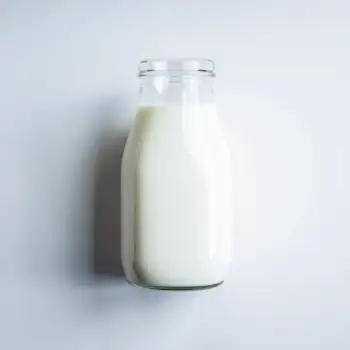Soy Milk vs Milk in cooking are two alternatives used for baking, making creamy soups and sauces, and enriching coffee and tea. Soy milk offers a dairy-free, nutty-flavored option, while milk provides a rich, creamy taste and is traditional for pastries and frothy coffee drinks.

Soy milk is a plant-based nondairy beverage made from soybeans. It's a versatile alternative to cow's milk, often enriched with vitamins and minerals.

Milk, often referred to as cow's milk, is a nutrient-rich liquid produced by mammals. It's a common ingredient in numerous dishes and is known for its high calcium content.
Soy milk and cow's milk differ in source (plant vs. animal), nutritional profile, taste, and texture. Soy milk is naturally lactose-free and has a nuttier flavor, while cow's milk is creamier with a mild taste.

Your ultimate Recipe Box, Meal Planner, and Cooking Class all in one
Ideal for dairy-free baking, soy milk can be used in cakes and bread. It imparts a subtle nutty flavor and can be a 1:1 substitute for cow's milk. Milk is a traditional choice for baked goods, contributing to the richness and color of the final product. It's perfect for pastries, custards, and pancakes.
Soy milk can be used to create lactose-free creamy soups and sauces. It thickens well and complements vegetable-based dishes. Milk adds a smooth, rich texture to soups and sauces. It's ideal for classic recipes like béchamel sauce and potato soup.
Soy milk is a popular dairy-free option for coffee and tea, offering a creamy texture without curdling. It's also a source of protein for vegan diets. Cow's milk is a classic choice for coffee and tea, providing a rich and creamy mouthfeel. Full-fat milk creates a luxurious froth for lattes and cappuccinos.
Soy milk is often fortified to match the nutritional profile of cow's milk, but the natural compositions of both beverages differ, particularly in protein and fat content.
| Nutrient | Milk ( per Cup ) | Soy Milk ( per Cup ) |
|---|---|---|
| Fat | 0-8g | 4g |
| Sodium | 100mg | 90-150mg |
| Calcium | 300mg | 300mg |
| Protein | 8g | 7g |
| Calories | 100-150 | 80-100 |
| Carbohydrates | 12-13g | 4g |
Yes, soy milk is a suitable alternative for those with dairy allergies or lactose intolerance, as it is plant-based and lactose-free.
Soy milk can replace cow's milk in most recipes at a 1:1 ratio, but it may not behave identically in all culinary applications, especially where frothing or curdling may occur.
Soy milk typically has a similar protein content to cow's milk but can vary in fat and carbohydrate content. It's often fortified with calcium and vitamins to closely mimic cow's milk's nutritional benefits.
Soy milk has a distinct, nutty flavor and is less sweet than cow's milk. The taste can vary between brands, especially between sweetened and unsweetened varieties.
Yes, soy milk is a great option for vegans as it is plant-based and contains no animal products.